originally posted at https://canmom.tumblr.com/post/162457...
The story so far
Various branches of a rich family, the Ushiromiyas, have gathered at the home of the head of the family, a man named Kinzo, for their annual gathering.
There are two generations present:
- the cousins:
- Battler (protagonist)
- George (his mature, sensible best bro)
- Maria (a nine-year-old girl)
- Jessica (similar age to Battler, struggling with school, in line to inherit the ‘head’ estate)
- their parents:
- Rudolf (Battler’s father, who cheated on his mother before her death, and Battler hates)
- Kyrie (Battler’s stepmother, who Battler is on casual friendly terms with)
- Eve (George’s mother, prone to cruel sarcastic jabs and status games)
- Hideyoshi (George’s father, CEO of a company and generally laid-back)
- Rosa (Maria’s mother, generally calm and kind)
- Natsuhi (Jessica’s mother, treats the servants poorly, was humiliated by Eve over tea service)
- Krauss (Jessica’s father, yet to appear but apparently at odds with Natsuhi)
The remaining characters various servants, two of whom - Kanon and Shannon - are young adults who seem to very obviously be in a situation of abuse to the point that they’re expected to behave like furniture while being viciously scapegoated and harassed.
The remaining servants include:
- Kumasawa Chiyo, a kind elderly woman with a robust sense of humour
- Gohda Toshiro, a man who formerly worked at an expensive hotel, and is also abusive towards Kanon and Shannon
- Ronoue Genji, the chief servant and the one closest to Kinzo.
Finally there is Nanjo Terumasa, a doctor who has given Kinzo a poor prognosis, and Beatrice, apparently some kind of witch.
At the end of the last post, Battler - prone to sexually harassing ‘jokes’ on his cousins - almost sexually assaulted Shannon, but played it off as a joke/misunderstanding. Now the cousins are going to join the parents for dinner.
Murder count: 0.
Comments!
One thing I rather neglected in the Kingdom Hearts playthrough was to respond to the various lovely and informative comments people left during the run. So let’s do it now.
On part 1, @red-zora commented: “to get an indication of lenght, umineko (core arc and chiru)’s englishh translation is jus tunder 1,000,000 words, so it is VERY long. about a long as homestuck actually, and the two have… a lot fo similarities otherwise, too"
Yeah, damn. We’re going to be here a while!
On part 2, @mellifluouslutrinan commented: “european noble houses had cadet branches, formed usually from the non-heirs being granted lesser titles (wp informs me this was also a thing during China’s Western Zhou dynasty but i know nothnig abt that)“
interesting! I guess it makes sense for houses with an excess of children to have noble options other than ‘heir’, ‘married away’, as an alternative to roles such as becoming a priest, joining the army etc. that don’t necessarily give them more power? idk.
also many thanks for a friend who would prefer to remain unnamed filling in some Japanese culture aspects I wasn’t familiar with, and @alchymistryandcoldsteel for your lovely encouragement.
friend’s notes:
-
friend: kansai dialect is more like a southern thing? in american localisation they all have a southern drawl. not sure what the english equiv would be. maybe londoner for kanto versus something more farmish?
- canmom: ok, somerset or something. that makes sense
- friend: *nodnod* generally speaking in japanese culture kansai people are characterised as like country boys with attitude and wild personas
- very yee haw cowboy i guess haha
- some people look down on kansai speakers as being uneducated or unsophisticated
-
friend: jin is also considered "man” in the “person” sense like “man kind” so it might be more literal to say fightman
- canmom: haha wow that’s a name
- friend: it sure is xD i had a laugh. he’s probably going to be the kind who opens his mouth before thinking
-
friend: i might hazard a guess that maria is not her name
- canmom: they have this thing about everyone having english names and that being weird? but idk
- friend: マリア is what it would be in katakana (used for loanwords) unless like battler they’ve come up with a bizarre explanation for the kanji used in her name
- if this is made by a japanese company they do like to um give characters english names?? like the more … attention they want for them the more they’ll use english. like “chad” in bleach even tho everyone calls him sado
- canmom: this is Battler’s comments on Maria’s name:

- cont.
- friend: squints hm
- ok so I looked up the kanji
- she is maria but in a “separate components” way
- the kanji for her name translates to “true village asia”
- :x
- canmom: wow
- friend: but pronounced ma / ri / a
- i mean i have no context for why someone would be named this way, or if there is any particular meaning to the kanji used to make up the name – as in, if there is a reason they used this set as opposed to something else / if the individual kanji meanings have any relevance
- sometimes they don’t, sometimes it’s just “maria written with the kanji for true village asia"
- japanese is weird honestly. well it’s more kanji that’s weird. hiragana and katakana are fairly straightforward
-
friend: lgbt people in japan as a whole have it very tough. in theory however a trans woman would simply switch to using the feminine mannerisms like saying watashi / atashi instead of boku or ore for "i”, or ending more sentences in desu/masu (to denote politeness / demureness)
- would likely also refer to all men as “-san” and all women “-chan” (well all women they are close to – san should be still use w strangers). “kun” if they are VERY close to the man
-
friend: the boob thing
- ok so, there’s this… theory i have found in like, local folktale urban legend things that rubbing breasts make them bigger and breasts are like… the epitome of feminine softness (culturally)
-
friend: japanese rich families are SERIOUS BUSINESS tho
- like. it’s essentially a modern day take on dynasties.
- even if not like, yakuza, businesses tend to be family run. the CEO of a company will likely expect their heir to take over upon their death
- a lot of sort of… mystique around them is similar to yakuza stories like “oh that guy is the son of so and so business group. he’s so important let’s be deferential”
- and tbh the whole like “incest but it’s okay bc you’re not REALLY related bc step siblings / distant cousins / etc” whatever is just as big in japan as it is in the west and marriage arrangements are still practiced and someone might actually marry a distant cousin
-
friend: i hope you don’t mind me like sharing all this haha! it’s rare that my trivial knowledge comes in handy
- canmom: it’s very welcome! :) helps give me context bc there’s a lot of cultural norms i’m not familiar with, even with the little notes they put in
- friend: okies! and if you have any questions as you go also you’re welcome to ask!
- i mean i’m not japanese but like half my family lives there so
Lunchtime
Battler encounters a big portrait of someone that wasn’t there six years ago I’m guessing this is Beatrice.
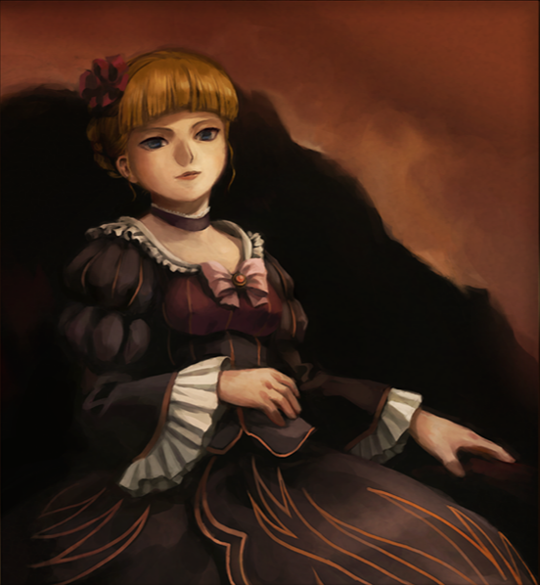
We learn Kinzo had this painting hung two years prior, and commissioned it some time before that. The narration makes it clear that she’s not supposed to read as Japanese.
Sure enough, it’s Beatrice. Battler gives us a quick lecture on the dangers and mythological significance of forests as the origins of the Beatrice tale.
Jessica explains that Kinzo believes strongly in the story, and hung this painting to convey it to his grandchildren. The children aren’t impressed.
Next we get a lecture on status as expressed in seating positions at the dinner table. The main point to observe is that direct descendants of the family get precedence over spouses, which the narration highlights as unusual.
Battler gives us another lecture on misogyny, which, considering who’s talking, is pretty fucking rich.
We learn that Kinzo is now regularly late for meals, a major change from six years prior. And because of formal dining rules, nobody eats until he shows up.
He’s reading. What a nerd. We find Krauss has gone to fetch him. Kinzo is not pleased.
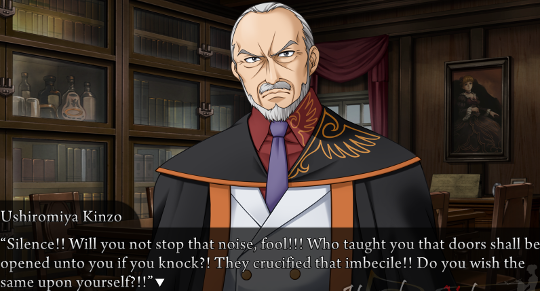
At least he’s witty?
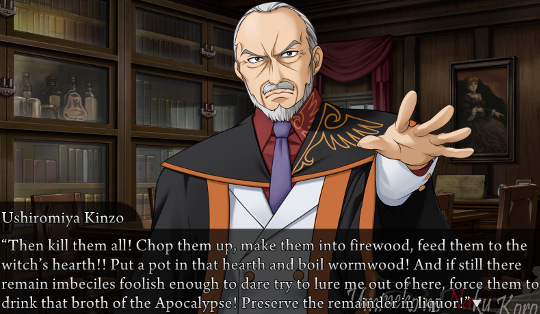
Kinzo is, we can say, not particularly excited for a family reunion.
We get our first look at Krauss…
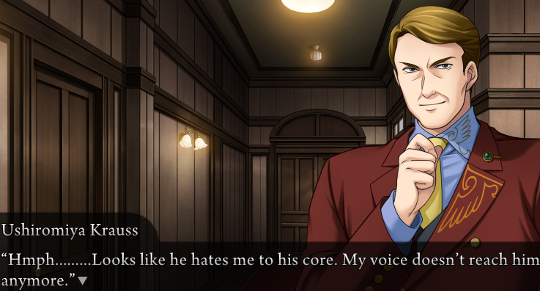
He is literally the human personification of smugness.
For all his great wealth, it seems there is one thing Kinzo lacks…
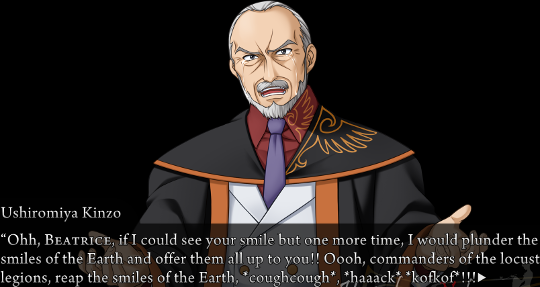
…an indoor voice.
Kinzo’s books consist of ‘forbidden, cursed or sealed’ books, which he insists on calling grimoires. It’s a proper wizard’s study - no doubt somewhere he has a skull with a candle on top.
Kinzo and Genji have a drink and reminisce. Kinzo trash-talks his kids and grandkids, and has another rant about Beatrice being ‘his entire life’ and belonging to him. He comes to a decision on the basis that the power of magic depends on the risk.

At dinner, Battler meets Nanjo, and we can fill in the character screen at last.
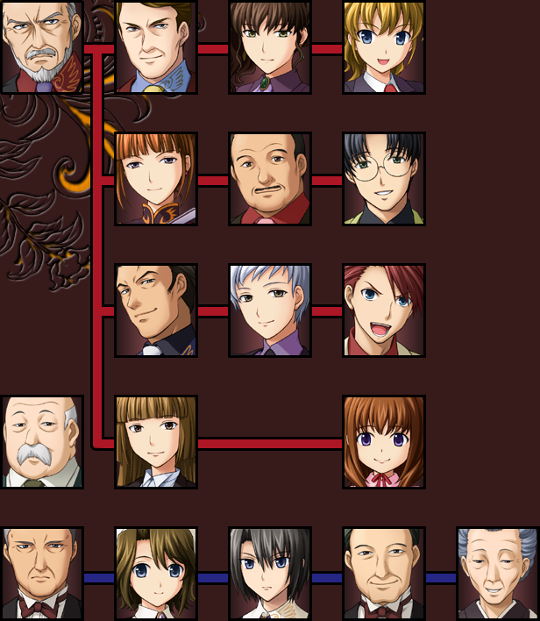
With all the faces together like this, it becomes especially obvious that the female characters suffer a lot of sameface syndrome. Cut out the hair and it would be very difficult to tell any two of these female characters apart, with the exception of Kumasawa. Lose the eyes and it would be impossible. The same is not remotely true of the male characters, whose faces are varied and expressive.
So now Battler offers us a huge exposition dump to explain Kinzo’s story…
We start before the Showa era (which the translators helpfully note as 1926-1989). The Ushiromiyas were prosperous mill-owners until the Meiji (1868-1912) and Taisho (1912-1926) eras. Kinzo was a member of a branch family, not in line to inherit. But the family mansion in Odawara was wiped out during the 1923 Great Kanto Earthquake, and all their spinning mills burned down. Kinzo inherited what was left, used it as collateral to take out a huge loan, and then experienced a lot of incredible luck in business which he used to forge connections with the Allied forces in post-WWII Japan and get stinking rich. Through his connections, he was ready in advance to supply the Korean War.
Battler comments that only the ‘super-rich’ made a lot of money off America’s ‘emergency demands’ for the Korean War, and most citizens remained poor. Battler says this happened in 1950 (which would indeed correspond to the start of the Korean War) so it took Kinzo 23 years to revive the family.
After the war he did some economic finagling to obtain the island involving the GHQ, which I don’t fully understand, but meant Tokyo couldn’t get it back. Battler comments that part of his success was due to his command of English due to a ‘West’ obsession, which allowed him to make connections with GHQ more easily.
I do feel like, props to the author for tying this in with actual history so tightly. Knowing this much about history doesn’t seem entirely in-character for Battler, but eh.
In any case, at some point towards the end of his life, the guy got into black magic. Battler finishes by speculating that, in the present with less turbulent times, he probably wouldn’t have been nearly so successful.
Having finished the history lecture, we’re treated to a lunch lecture. It’s thankfully not quite Redwall level. tl;dr: the fish was good and so was the dessert. Kumasawa is sweet and Gohda shows off.
We get a less detailed backstory on Gohda. Apparently he was forced to retire due to internal faction politics at his former hotel.
The kids all bugger off to the beach and it’s time for the adults to get the daggers out again…
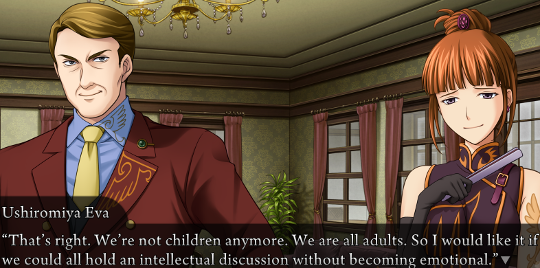
As has been heavily hinted, they’re here to discuss the divvying-up of Kinzo’s fortune. The music gets very grim now.
They discuss his odds of living to the next year. To be honest, I don’t think he has much chance of surviving to the next scene at this rate.
Apparently the fortune amounts to tens of billions of yen. In October 1986 when this game is set, one US$ was worth 156 yen (per Wikipedia). $100 in 1986 corresponds to $223.11 in 2017 (some website). So, ten billion yen in 1986 corresponds to about 140 million US dollars today. Blimey. (Would it be more correct to convert past yen to current yen and then to dollars? Either way, similar order of magnitude I guess?)
But because some of it is capital in non-money forms, it’s hard to split evenly.
In any case, Krauss and Natsuhi are much more reluctant to discuss the splitting of the inheritance than the rest of the group, even Rosa. This leads to… vicious verbal sniping, what else?
We get some political/economic context: the yen is rising on the dollar (evident in the data I looked at; Eva speculates about 100 dollars to the yen), and also there’s a legal change for happy capitalists…
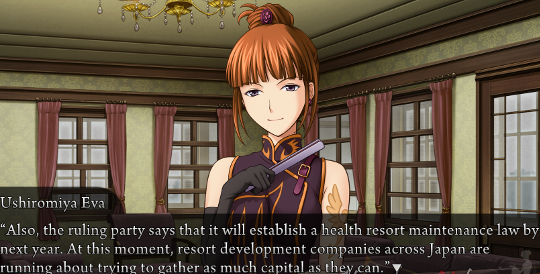
The ‘ruling party’ would be the Liberal Democratic Party, a conservative party. The prime minister at the time was Yasuhiro Nakusone, who was pursuing privatisation policies much like his contemporaries Reagan and Tatcher.
There’s further discussion of the economic situation in Japan in 1986.
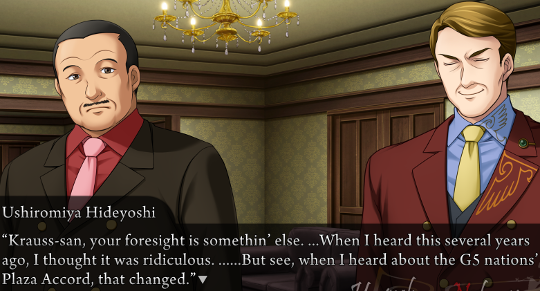
The Plaza Accord concerned exchange rates; the dollar was depreciated against the yen and Mark.
The author of this game has certainly swallowed at least one textbook on the economic history of Japan.
In any case, this is all pretext to attack Krauss’s economic insight and argue about the inheritance. Krauss’s reason for the new builds on the island is to open a resort. But the siblings are skeptical… or more precisely, they say the project fell through because Krauss mismanaged it and the predicted resort boom had not yet come. Hence, Krauss has huge debts. Implication: he’s been using Kinzo’s money to cover his losses. Committing embezzlement.
Eva’s voice actress does a splendid job of portraying her vicious glee as she levels the accusation. She’s got a good evil laugh too.
I didn’t think an argument over money could actually be quite exciting, but the writing’s coming into its own now, and the pacing is a lot better. Now, when do the murders start?
Eva mentions the bird icon all the Ushiromiyas wear. Apparently it’s called the One Winged Eagle. The whole deal with direct descendants > spouses is brought up explicitly as Eva tears into Natsuhi over her attempt to assert authority.
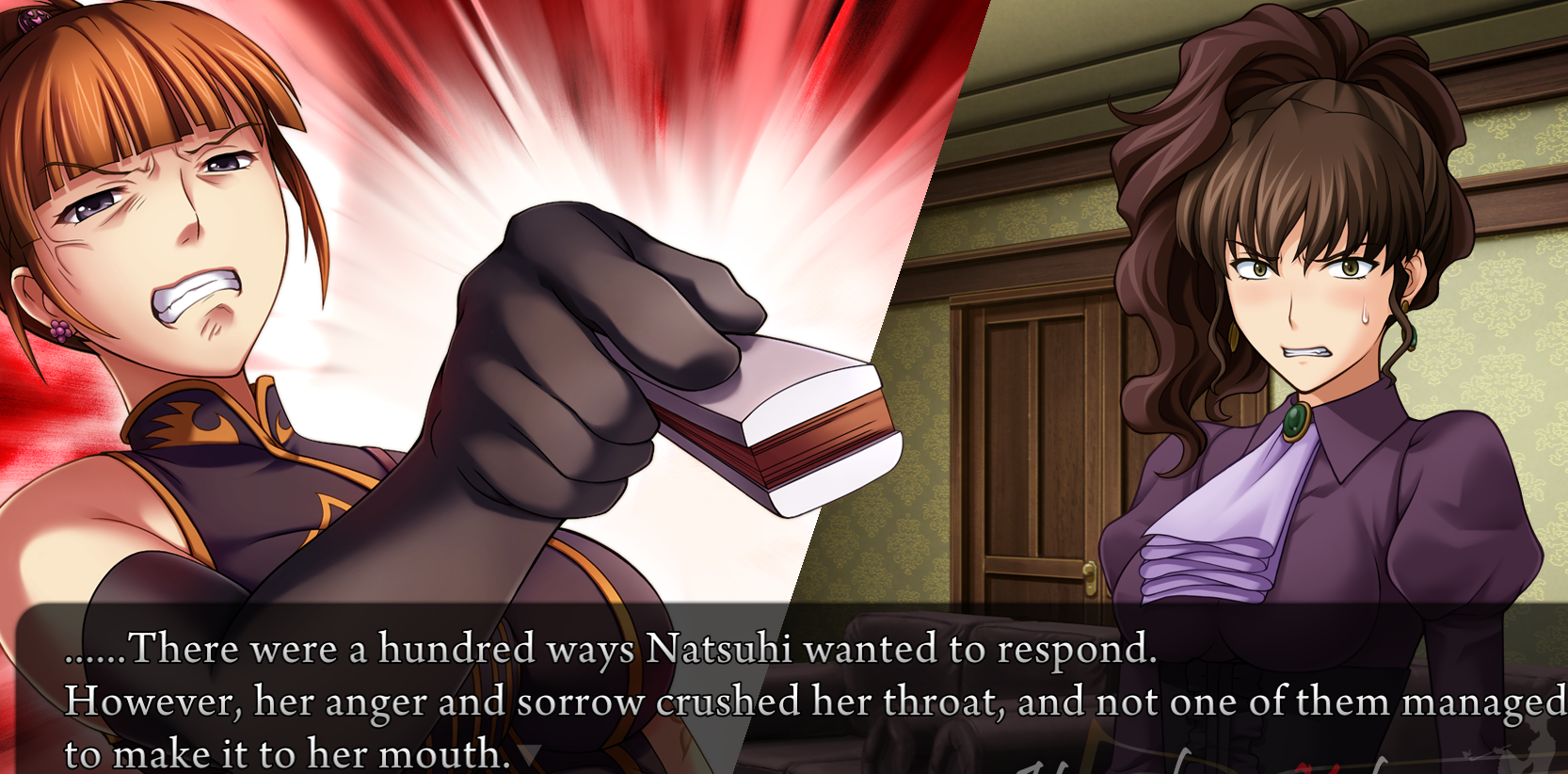
The bourgeoisie are pretty fucked up huh.
Natsuhi leaves in tears. And Krauss doesn’t stand by her one bit, dismisses her completely coldly. Suspecting the Ushiromiyas are literally made of snakes.
Kumasawa drops by to explain the situation underlying their rivalry.
So. Usual rule: woman marries outside of Ushiromiya clan, no longer part of the hierarchy. So Eva would be disqualified.
But, Krauss and Natsuhi had no kids. And patriarchal rule is no kids = woman is worthless. Kinzo abused Natsuhi for being childless. Eva took advantage, and persuaded Kinzo to change the rule and let her stay in and have an heir even if she married.

And Natsuhi, of course, blames herself. This is grim :(
Kumasawa repeats a line: “How heartrending… I cannot do anything but watch over from the shadows”, much as she did with Kanon and Shannon earlier. That phrasing seemed maybe-significant before, but now it’s repeated, suspecting Kumasawa is Beatrice or something similarly out-there.
Things are happening at last, so this is finally starting to get good. Hopefully that will continue. Next time, back to the kids.
Comments
ann uh
god rich people creep me the fuck out
sympt
Apparently GHQ means General Headquarters (office of the Supreme Commander of the Allied Powers; 1945-1952). According to wikipedia: “Established on August 14, 1945, and based in Tokyo, SCAP (“GHQ”) directed the democratization and demilitarization of Japan until April 28, 1952